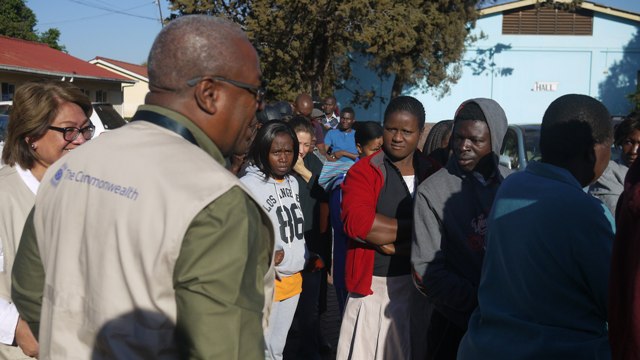In a move that parliamentary watchdog Veritas claims will hinder the holding of free and fair elections, the Zimbabwe Electoral Commission (Zec) increased fees for election observer missions by up to 600% from the 2018 amounts and centralized all accreditation applications on the chief elections officer, Utloile Silaigwana.
Zec has announced new escalating prices for foreign observers in a notice inviting individuals and organizations that seek to monitor the election procedures, polling, and the counting and collation of ballots.
The cost to accredit local observers and members of the local media remained at US$10, while the cost to accredit international observers from African nations increased five-fold, from US$20 to US$100.
The fees for accrediting foreign observers from non-African countries rose six-fold, from US$50 to US$300 for embassy staff.
In another new development, provincial offices of Zec can no longer receive applications from prospective election observers, both local or foreign, for onward submission to the Harare office. According to the Zec notice, all applications must now be directly handed over to Silaigwana at the electoral body’s Harare headquarters.
Zec set the deadline for submission of applications as 18 August, which is three days before the general elections. The body began receiving applications on 17 June. In previous polls, the pre-election day environment has been marred by violence and other malpractices such as intimidation, vote-buying and hate speech.
Some rural areas have been previously declared as no-go areas for the opposition. Observers, in order to fully assess the elections, need to scrutinise the complete electoral cycle comprising the pre-election period, Election Day and post-election stages.
In response to the conditions set by Zec, Veritas told The NewsHawks that already there are some constitutional provisions that have been violated.
“Contrary to what is said in the notice, not all applications for accreditation are made to the chief elections officer at Zec’s head office. Applications from ’eminent persons within Zimbabwe’ and representatives of local organisations must be made to provincial elections officers who will forward them to the chief elections officer (according to section 40I (1a) of the Electoral Act,” said Veritas.
The legal and parliamentary watchdog also stressed that independent election observation is important for the freedom and fairness of elections, to check whether the elections conform to democratic standards enshrined in the constitution and in regional and international treaties to which Zimbabwe is a party.
“Proper election observation enhances the fairness, transparency and credibility of elections and also encourages all parties contesting elections to accept the results.
“The African Charter on Democracy, Elections and Governance and the Sadc Principles and Guidelines on Elections both emphasise the importance of independent observers in ensuring that elections are transparent, credible and democratic. Zimbabwe is a party to both those instruments.”
Veritas added that the fees should not discourage local and international organisations from seeking to have their observers accredited. “. . . the discrimination had no rational justification — the cost of accrediting an observer is the same no matter where they come from. The fees are therefore almost certainly invalid. To enhance the credibility of the 2023 general elections, Zec should revert to the old fees,” said the parliamentary watchdog.
Applications that Zec must consider include individuals representing foreign countries or international organisations and foreign eminent persons who have applied to be accepted as observers; individuals representing local organisations and eminent persons from within Zimbabwe who have applied to be accepted as observers and individuals representing bodies that exercise functions similar to those of Zec who have been invited by Zec to observe the election.
Zec is also entitled at law to consider individuals representing foreign countries or international organisations and foreign eminent persons who have been invited by the Minister of Foreign Affairs to observe the elections and persons representing local organisations and eminent persons from within Zimbabwe who have been invited by the minister of Justice to observe the election.
Applications will then be considered by Zec’s Observer Accreditation Committee, which will make its recommendations to the electoral body led by its chairperson, Justice Priscilla Chigumba.
Applicants will then be notified as to whether or not their applications are successful.
In another shortcoming in its handling of the accreditation process, Zec has not made it clear whether it will comply with section 6 of the Electoral Regulations passed in 2013 which specify exemptions of observers that must not pay the accreditation fees.
The exempt ones are observers from the African Union, Sadc and Comesa as well as those from the Sadc Parliamentary Forum. The Electoral Commissions Forum of Sadc, electoral bodies in African countries and all embassies from African countries must also be exempted, but Zec has not made that condition public.
Since the time of the late president Robert Mugabe, the government has been sceptical of election observer missions mostly from the European Union and United States who unearth electoral malpractices.
The regime has therefore tried to keep them at arms-length in order to conceal its mechanisms of alleged rigging of elections.

For comments, Feedback and Opinions do get in touch with our editor on WhatsApp: +44 7949 297606.
